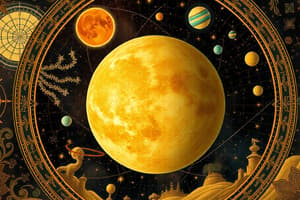Podcast
Questions and Answers
El núcleo de Jupiter es principalmente rocoso
El núcleo de Jupiter es principalmente rocoso
True (A)
Venus es un planeta gaseoso
Venus es un planeta gaseoso
False (B)
Jupiter tiene un total de 50 lunas
Jupiter tiene un total de 50 lunas
False (B)
La misión de la NASA, Juno, ha estado investigando Venus y sus lunas desde 2016
La misión de la NASA, Juno, ha estado investigando Venus y sus lunas desde 2016
Jupiter ejerce una gran influencia en la formación de la órbita de la Tierra
Jupiter ejerce una gran influencia en la formación de la órbita de la Tierra
Flashcards are hidden until you start studying
Study Notes
Planets in Our Solar System: A Focus on Venus and Jupiter
Our solar system is a vast and diverse collection of celestial bodies, each with its own unique characteristics. Among these, two stand out for their size and significance: Venus, the second planet from the Sun, and Jupiter, the largest planet in our solar system.
Venus
Venus is often referred to as Earth's twin due to its similar size and composition. It has an equatorial diameter of about 7,521 miles (12,104 kilometers), which is roughly the same width as Earth. Venus is the second planet from the Sun, orbiting at an average distance of 67.2 million miles (108 million kilometers). It is about 26 million miles (42 million kilometers) closer to the Sun than Earth.
Venus is a rocky planet with a thick atmosphere, primarily composed of carbon dioxide, nitrogen, and sulfuric acid. Its surface is covered in volcanoes and craters, and it has the hottest atmosphere of any planet in our solar system. Despite its proximity to the Sun, the surface temperature is 864 degrees Fahrenheit (462 degrees Celsius), making it the hottest planet in our solar system.
Jupiter
Jupiter is the largest planet in our solar system, with an equatorial diameter of about 88,846 miles (142,984 kilometers). This gas giant is the fifth planet from the Sun, orbiting at an average distance of 483.7 million miles (778 million kilometers). It is about five times farther from the Sun than Earth.
Jupiter is mostly made of hydrogen and helium, with a small rocky core. Its most prominent feature is the Great Red Spot, a storm that has been raging for at least 300 years. Jupiter has a total of 79 moons, including the famous four Galilean moons: Io, Europa, Ganymede, and Callisto.
Jupiter's immense size and gravity have played a significant role in shaping our solar system. Its gravity has been found responsible for slinging Neptune and Uranus (along with a host of smaller objects) into their current orbits. Jupiter's gravity has also been a factor in the Late Heavy Bombardment, a period of time when the young planet Earth and its nearby neighbors were barraged with debris.
In recent years, advancements in space exploration have led to a renewed interest in Jupiter and its moons. For example, NASA's Juno mission has been investigating Jupiter and its moons since 2016, while the European Space Agency's Jupiter Icy Moons Explorer (JUICE) is expected to launch in the mid-2020s to study Europa and Callisto.
In conclusion, Venus and Jupiter are two of the most intriguing planets in our solar system. Venus, Earth's twin, is a rocky planet with extreme temperatures, while Jupiter, the largest planet, is a gas giant with a complex system of moons and a significant impact on our solar system's history.
Studying That Suits You
Use AI to generate personalized quizzes and flashcards to suit your learning preferences.



